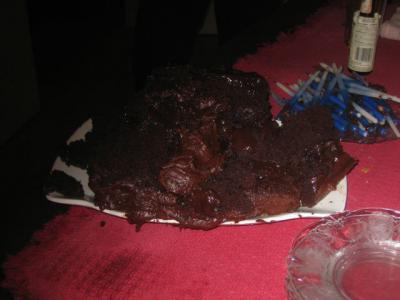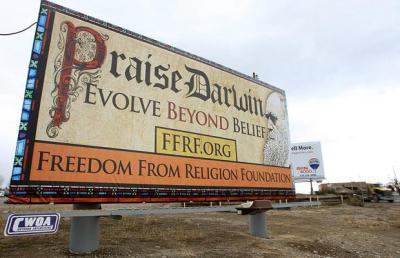Serendip is an independent site partnering with faculty at multiple colleges and universities around the world. Happy exploring!
Having Our Cake and Eating it Too?
Your webpapers: are you on this list????
Having our 'Crack' Cake and Eating it, Too

This week's challenge was provided by Lucie:

And the rest of us provided the commentary,
including pleas not to dismiss religious ways of knowing:
There were a striking number of meditations about the intersecting histories of science and religion:
Jackie M: science and religion had a common ancestor and endured a 'speciation event'...I don't think that religion should be considered older than science....science was a lifestyle, and those who fulfilled this lifestyle were able to yield descendents more suited to make the necessary observations....and question them too!...thus religion...was created....So temporally-speaking, science and religion seem really difficult to separate. I do think that scientific phenomena have led to religious inquiry, and that religious ideas have led to scientific curiosity/discovery.
Adele described the same "loop": I believe that people created religion in order to explain the questions that they did not have any answers to...Science is correcting the former theories of religion
several of you saw an evolutionary relation
between science and religion:
Rina: where does morality come
from? I started to ask myself if morality includes a sense of survival. If so, then maybe the divide between science and religion isn’t as big as I originally thought it was.
Rica: it could be a possible to say that science may be considered a type of religion...one of the main functions of religion is to provide people with an answer for their being, their existence...to provide guidance on how one should journey though life. Science does suggest a life of curiosity, observation, and testing.
(and religion too demands a fair amount of skepticism?)
Katie: I think that a similarity between science and religion is that they both require this dynamic-- to learn something, to question further, to learn something new, and to continue the process. I also think that they are often taught in a flawed, simplified way-- that children are first taught to believe and not to question, which is bad science and bad religion.
(if you are not one of the 35 of 41,
go back and "tag" your paper
"Evolution and Literature Web Paper 1");
also review formatting, naming, etc.
Our on-line comments:
not what we think of your paper,
but what the papers make us think of
(not evaluation, but generation)
go back and "tag" your paper
"Evolution and Literature Web Paper 1");
also review formatting, naming, etc.
Our on-line comments:
not what we think of your paper,
but what the papers make us think of
(not evaluation, but generation)
Having our 'Crack' Cake and Eating it, Too
This week's challenge was provided by Lucie:
Can we have our "crack" cake and eat it too, or does the
destabalization of "fact" too insiduously make possible its
appropriation by detrimental agendas? Is there a happy medium between
nihilistically clamining that "everything is subjective" and naively
accepting every "fact" we are taught?...I wonder how can we both accept that history and science are
subjectively informed, but also retain a knowledge that some things are
in fact fact, and desperately need to be recognized as such for the
sake of humanity....
This week's forum was ALL about the
similarities and differences
between science and religion.
Keely provided the image:
similarities and differences
between science and religion.
Keely provided the image:
And the rest of us provided the commentary,
including pleas not to dismiss religious ways of knowing:
Evelyn: religion is the foundation upon which my
immortal soul rests whereas science is the foundation upon which my
mortal body rests.
Erin: I just want it to be known that science and
religion are not mutually exclusive...it is possible to have both God
and evolution....Don't be exclusive of any story.
Keely: I do think religion and science are different, but I also don't think it is necessary to choose. I'm not sure why people think that science requires giving up other parts of one's life...why science can't overlap with other parts of life.
Laura: What bothered me was the inability of others to be tolerant of other stories. Why is there even a question of coexistance of stories? Does my belief in one idea really bother you that much?...maybe you need to find a better story for yourself.
Keely: I do think religion and science are different, but I also don't think it is necessary to choose. I'm not sure why people think that science requires giving up other parts of one's life...why science can't overlap with other parts of life.
Laura: What bothered me was the inability of others to be tolerant of other stories. Why is there even a question of coexistance of stories? Does my belief in one idea really bother you that much?...maybe you need to find a better story for yourself.
(NPR, via) Lisa: Evolution hurts people's feelings...taking evolution personally is an American phenomenon....
There were a striking number of meditations about the intersecting histories of science and religion:
Jackie M: science and religion had a common ancestor and endured a 'speciation event'...I don't think that religion should be considered older than science....science was a lifestyle, and those who fulfilled this lifestyle were able to yield descendents more suited to make the necessary observations....and question them too!...thus religion...was created....So temporally-speaking, science and religion seem really difficult to separate. I do think that scientific phenomena have led to religious inquiry, and that religious ideas have led to scientific curiosity/discovery.
Adele described the same "loop": I believe that people created religion in order to explain the questions that they did not have any answers to...Science is correcting the former theories of religion
several of you saw an evolutionary relation
between science and religion:
Abby: The point is to survive... continuing life is a better thing....Do I think you can add
to that with other beliefs? Sure, and for many people, myself included,
there needs to be a little something more and there are ways to
question, consider, and understand that (religion or spirituality being
a common way.)
Rica: it could be a possible to say that science may be considered a type of religion...one of the main functions of religion is to provide people with an answer for their being, their existence...to provide guidance on how one should journey though life. Science does suggest a life of curiosity, observation, and testing.
Marina: science and religion answer two
different questions. Science is the how and religion is the
why....science too demands a fair amount of faith.
Katie: I think that a similarity between science and religion is that they both require this dynamic-- to learn something, to question further, to learn something new, and to continue the process. I also think that they are often taught in a flawed, simplified way-- that children are first taught to believe and not to question, which is bad science and bad religion.
Tim: evolution opens up new
possibilities for humans, rather than shutting us down or making us
"merely material" beings...expanding, rearranging the patterns, and trying out new things....living
by the same old patterns and narratives is stagnant both biologically
and psychologically....
but how to balance the need for newness
w/ the need for predictability?
but how to balance the need for newness
w/ the need for predictability?
Tara: religion and science...will probably be in a war-like status for as long as both exist....God...is a filler for the
things we simply cannot explain....All of us...accept the idea that nothing really is for certain....religion, God,
science, truth...allow us to go
about our daily lives with a relative self-peace....people look for answers, via
God or science, because we want stablity.
If you're interested in exploring these questions further
come on Monday @ 7 p.m. to the Multicultural Center
for the next Cafe Scientifique
In the interim?
What dangerous ideas might Dennett have about Darwin's dangerous ideas....? How about our moving on from biological evolution to some, um....meaning, culture and aesthetics?
What dangerous ideas might Dennett have about Darwin's dangerous ideas....? How about our moving on from biological evolution to some, um....meaning, culture and aesthetics?
Keely: I have been doing the reading for this week and I don't really know
what to think of it. The author keeps talking about how Darwin's ideas
will bring us to some incredible conclusions. I'm a little skeptical and I wish he would just tell us already.


